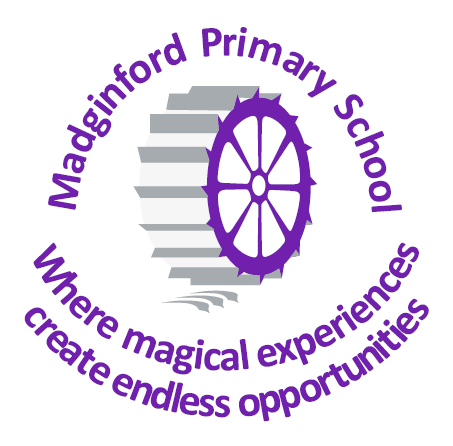EYFS
Welcome to EYFS
At Madginford Primary School, in EYFS, we lay the foundations of the school’s vision of developing learning where magical experiences create endless opportunities. We strive to enhance curiosity and creativeness within children, whilst developing a sense of individual challenge that encourages the children to be the best that they can be.
The teachers of our three classes work closely together to ensure that all children are provided with the same opportunities in their learning.
Our curriculum is designed so that it lays the foundations for learning and promotes school readiness, exploring and deepening skills across a wide range of subjects, where children have clear opportunities to play and explore, become active learners and create and think critically. There are planned opportunities to develop skills from both the prime and specific areas of the EYFS curriculum, where children have opportunity to learn, practise, rehearse and retain skills.
EYFS Curriculum
The EYFS curriculum at Madginford is based on three core elements;
EYFS principles: There are 4 key principles which shape the Early Years practice. Unique child, positive relationships, enabling environments, learning and development, which all hold equal importance.
Characteristics of effective learning: Adults reflect on and adapt learning based on how best the individual children in their class learn using the three characteristics; playing and exploring, active learning and creating and thinking critically.
Educational Programmes: These are the statutory activities and experiences that make up each area of learning within the EYFS key stage, split into prime (Communication and language, Personal, social and emotional development and Physical development) and specific areas (Literacy, Mathematics, Understanding the world and Expressive arts and design).
Continuous provision and enhancements
The EYFS environment lends itself to both continuous provision, providing resources that children can access without the support of an adult, and enhancements, where resources are linked to one particular theme, topic or idea and are continually updated and added to the environment. The theme, topic or idea is linked to the development of skills. (see progression of skills document).
How does this look within the setting?
Throughout the day, the children engage in two kinds of activities; teacher-directed and child-initiated learning. During teacher-directed learning time, the children are taught specific skills and introduced to key knowledge. Through the child-initiated learning time, the children are provided with ample opportunity to practise and rehearse the taught skills so that they can develop at their own pace and from their individual starting points. Adults skilfully question and develop the learning that the children choose to do for themselves.
Teacher-directed sessions include but not limited to: Dough Disco, Pen Disco, Phonics, Target Time, Maths and Let’s Discover. It is through ‘Target Time’ that key concepts around Literacy are developed and a wide variety of subject areas are explored via ‘Let’s Discover’ sessions.
Child-initiated sessions are referred to as SPLASH sessions - self-chosen, planned learning and shared outcomes where children can practise skills through their own interests. Children have access to a range or areas within the setting to support their learning which includes both indoor and outdoor learning opportunities. The mud café, forest school area, garden (including water and sand), builders’ yard, reading garden, SPLASH zone, ready steady cook area and library all lend themselves to open-ended learning opportunities.
By the end of the reception year, we envisage that our children are happy and confident children who have developed a love of lifelong learning, having made progress from their individual starting points. They are children who have the skills and foundations to face the excitement of the school years ahead of them.
